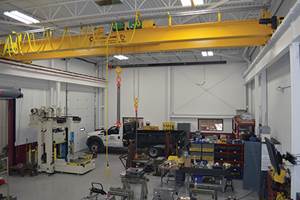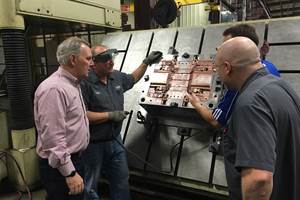Farming Out the Entire Mold Build Process Keeps Capital Equipment Costs Down and Volume Up
Turning to another source for the entire mold build process keeps capital equipment costs to a minimum while pushing volume through your shop.
In a business climate that grows increasingly competitive as it gets more global, more and more moldmakers are realizing that a little help may be in order sometimes to stay competitive and keep delivery times on schedule. Plus, instead of spending an inordinate amount of money on a piece of equipment that will hardly be used, it makes sense to look to another source that already has that piece of equipment. Outsourcing the complete mold build process is a way to stay on track without losing any profit.
Rochester, NY-based Liberty Precision Industries - a mold builder with capabilities for 150- to 1000-ton press sizes - provides outsourcing services for the entire process. According to applications engineer Sal Fasciano, Liberty itself shares core technologies with a number of mold-makers. "There aren't many companies that can do it all and make all deliveries in-house," he states. "Either a moldmaker is too busy or just doesn't want to purchase that extra capital equipment. If times become slow, the capital equipment becomes a burden, so it makes sense to partner up with a few companies and outsource as well as be the provider of outsourcing services."
Roger Reiner, the business group manager for the company's Mold Solutions Group, states that outsourcing some of the mold build process helps to fix a moldmaker's costs on a job and reduces risk. "When a moldmaker outsources to a shop, they get a quote based on the service provider's equipment and expertise," he comments. "That usually helps them button down the costs so they can get a fixed budget on it.
"It's the same with human resources," Reiner continues. "If a mold shop is very busy, but they still want to increase their volume and they don't like to say no to work, they can utilize other moldmakers' employees so they can take that job through their shop and turn it into revenue for them."
Making a Match
With a seemingly endless supply of mold shops out there - each with its own specialty - how does one find the right service provider to meet all of its needs? Reiner says it all comes down to compatibility, quality and dependability. "When another moldmaker comes to us they like to know that we are compatible with their software and their tooling equipment," he says. "We look for vendors and vendors look for us to complement their internal core technologies - anything from a person who knows how to do something really well to a machine tool that not many people have. Another aspect of compatibility is how the service provider interacts with the mold shop's people and engineers."
It's also important to seek out a provider that has the same quality standards your company holds. "When we go to another vendor we want to know if they are ISO or QS compliant because we work with Tier 1 suppliers and that is often a prerequisite," Reiner comments.
And last, but not least, dependability is key. Reiner urges moldmakers to keep a history of all service providers' track records. "Make sure that you not only note the quality of the work the service provider has delivered, but also the dependability on delivery and how they handled changes," he recommends.
Fasciano recommends referrals from other moldmakers to find a reliable outsourcer. "We have become active in moldmaking associations so we can meet other moldmakers face-to-face and see who's doing good work versus just taking a stab at some unknown," he says. "The moldmaker should ask the service providers for references. Call those references and ask about the provider."
Keep the Lines Open
Once a moldmaker has chosen an outsourcer with which to work, keeping the lines of communication open is paramount to having a successful mold build. First and foremost is to ask plenty of questions of your provider, Reiner maintains, like the following:
- What is your quality program?
- Is your software compatible with ours?
- How will you manage our project through your shop?
- What will we see in terms of progress reports?
- Can we drop in at any time and take a look at the project?
- What kind of payment plan do you expect?
"The real test comes down to what is the service provider delivering and how are they delivering it. The mold shop can usually figure on one to two projects - depending on the size of the projects - before it is comfortable with that vendor," Reiner adds. In addition, Fasciano recommends visiting the shop for not only peace of mind, but also the chance to see how clean and organized the shop is.
Fasciano recommends that the designers and lead moldmaker work with the service provider. "Take advantage of all means of communicating: face-to-face meetings, e-mail, digital imaging, websites, tool shows, trade magazines," he says. "Get involved because the smoother your communication efforts are with the service provider, the more likely you are to make a profit."
Although Reiner acknowledges it's tough to determine exactly how much money a moldmaker saves by outsourcing the mold build process, he feels it's directly relative to the complexity of the work. "The real savings are in keeping your capital equipment expenditures down by just purchasing core technology type of equipment and by outsourcing when you have overflow," he states. "Then, you will be able to increase your sales and raise your margin. Think of it as an investment."
Related Content
The Critical Role of Management Representatives in ISO 9001
In ISO 9001 quality management systems, the Management Representative (MR) plays a crucial role. While the 2015 version of ISO 9001 no longer mandates this position, having a trusted management member serve as an MR remains vital for streamlining operations and maintaining quality standards.
Read MoreDynamic Tool Corporation – Creating the Team to Move Moldmaking Into the Future
For 40+ years, Dynamic Tool Corp. has offered precision tooling, emphasizing education, mentoring and innovation. The company is committed to excellence, integrity, safety and customer service, as well as inspiring growth and quality in manufacturing.
Read MoreThe Trifecta of Competitive Toolmaking
Process, technology and people form the foundations of the business philosophy in place at Eifel Mold & Engineering.
Read MoreOEE Monitoring System Addresses Root Cause of Machine Downtime
Unique sensor and patent-pending algorithm of the Amper machine analytics system measures current draw to quickly and inexpensively inform manufacturers which machines are down and why.
Read MoreRead Next
Mold Builders Carve Lean Niche
Commodity-oriented consumer manufacturing left North America, but mold industry survivors are finding strong growth in technical market sectors.
Read MoreReasons to Use Fiber Lasers for Mold Cleaning
Fiber lasers offer a simplicity, speed, control and portability, minimizing mold cleaning risks.
Read MoreHow to Use Strategic Planning Tools, Data to Manage the Human Side of Business
Q&A with Marion Wells, MMT EAB member and founder of Human Asset Management.
Read More




















